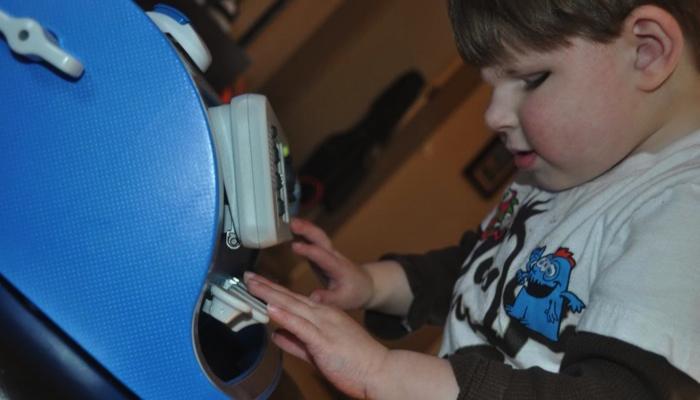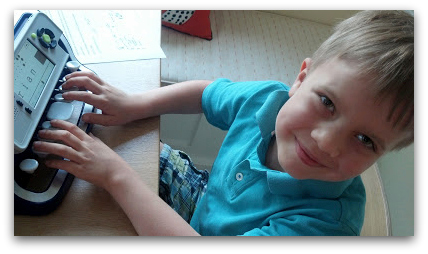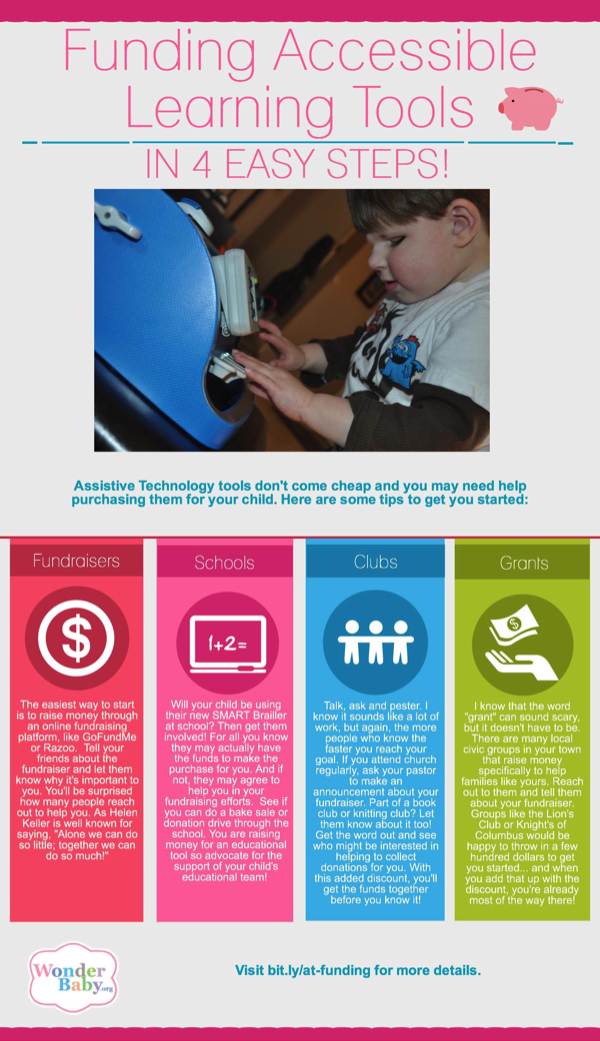Funding Accessible Learning Tools in 4 Easy Steps

The problem isn’t that you need to find the perfect learning tool for your child… the problem is finding a way to afford the perfect learning tool for your child!
Kids who are early braille learners need tools like the SMART Brailler®. The SMART Brailler includes a visual display screen where parents and teachers can see what the child is typing in both print and braille, bridging the gap between sighted parents and visually impaired kids. It also offers audio feedback, so young children who are drawn to sound or need that added incentive are much more motivated to interact with this brailler.
Throw in the Building on Patterns app from APH that allows kids to work on drills and exercises right on their brailler and you’re sold… this is a must-have literacy tool for kids with visual impairments.
The SMART Brailler has also been reviewed by AFB Access World to great acclaim and has transformed the way the Florida School for the Deaf and Blind teach braille to early braille learners as well as those transitioning from print to braille. See their three powerful videos here.
Sign me up!
But wait… what’s the price tag???

Finding Additional Funds (in 4 easy steps!)
Tools like the SMART Brailler don’t come cheap and you may need help purchasing them for your child.
 1. Start a Fundraiser
1. Start a Fundraiser
The easiest way to start is to raise money through an online fundraising platform, like GoFundMe or Razoo.
Tell your friends about the fundraiser and let them know why it’s important to you. You’ll be surprised how many people reach out to help you. As Helen Keller is well known for saying, “Alone we can do so little; together we can do so much!”
 2. Get Your School Involved
2. Get Your School Involved
Will your child be using their new SMART Brailler at school? Then get them involved! For all you know they may actually have the funds to make the purchase for you. And if not, they may agree to help you in your fundraising efforts.
See if you can do a bake sale or donation drive through the school. You are raising money for an educational tool so advocate for the support of your child’s educational team! The more people who are involved and the more people who know about your fundraising efforts, the faster you’ll reach your goal.
 3. Talk to Your Church or Other Organizations
3. Talk to Your Church or Other Organizations
Talk, ask and pester. I know it sounds like a lot of work, but again, the more people who know the faster you reach your goal. If you attend church regularly, ask your pastor to make an announcement about your fundraiser. Part of a book club or knitting club? Let them know about it too! Get the word out and see who might be interested in helping to collect donations for you. With this added discount, you’ll get the funds together before you know it!
 4. Apply for Grants
4. Apply for Grants
I know that the word “grant” can sound scary, but it doesn’t have to be. There are many local civic groups in your town that raise money specifically to help families like yours. Reach out to them and tell them about your fundraiser. Groups like the Lion’s Club or Knight’s of Columbus would be happy to throw in a few hundred dollars to get you started… and when you add that up with the discount, you’re already most of the way there!
Need help finding groups to contact? Check out this list and see who’s active in your town.
You can get the learning tools for your child that you need… you may just need a little help to get there.

Related Posts

Eye Conditions and Syndromes, Visual Impairment
Neuralink Announces Plans to Restore Sight to the Blind with Brain Chip
Elon Musk’s company Neuralink has announced plans to begin human trials of its new “Blindsight” brain chip by the end of 2025.

IEPs
What Should I Bring to My Child’s First IEP Meeting?
Prepare for your child's first IEP meeting with confidence! Discover exactly what documents to bring, including educational records, medical info, and questions to ask.

Special Needs
5 Spring Cleaning Tips for Families of Children with Disabilities
Spring cleaning is an opportunity to create a more accessible, organized, and supportive space for your child with disabilities. Declutter, deep clean, and refresh!